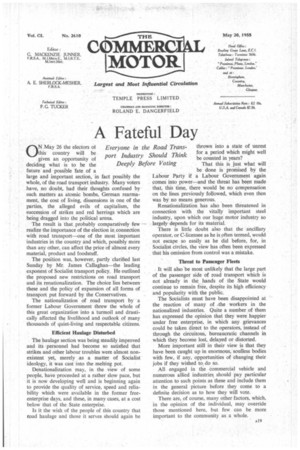A Fateful Day
Page 21

If you've noticed an error in this article please click here to report it so we can fix it.
ON May 26 the electors of this country will be given an opportunity of deciding what is to be the future and possible fate of a large and important section, in fact possibly the whole, of the road transport industry. Many voters have, DO doubt, had their thoughts confused by such matters as atomic bombs. German rearmament, the cost of living, dissensions in one of the parties, the alleged evils of capitalism, the succession of strikes and red herrings which are being dragged into the political arena.
The result is that probably comparatively few realize the importance of the election in connection with road transport—one of the most important industries in the country and which, possibly more than any other, can affect the price of almost every material, product and foodstuff.
The position was, however, partly clarified last Sunday by Mr. James Callaghan—the leading exponent of Socialist transport policy. He outlined the proposed new restrictions on road transport and its renationalization. The choice lies between these and the policy of expansion of all forms of transport put forward by the Conservatives.
The nationalization of road transport by a former Labour Government threw the whole of this great organization into a turmoil and drastically affected the livelihood and outlook of many thousands of quiet-living and respectable citizens.
Efficient Haulage Disturbed The haulage section was being steadily improved and its personnel had become so satisfied that strikes and other labour troubles were almost nonexistent yet. merely as a matter of Socialist ideology, it was cast into the melting pot.
Denationalization may, in the view of some people, have proceeded at a rather slow pace, but it is now developing well and is beginning again to provide the quality of service, speed and reliability which were available in the former freeenterprise days, and these, in many cases, at a cost below that of the State enterprise.
Is it the wish of the people of this country that road haulage and those it serves should again be thrown into a state of unrest for a period which might well be counted in years?
That this is just what will be done is promised by the Labour Party if a Labour Government again comes into power—and the threat has been made that, this time, there would be no compensation on the lines previously followed, which even then was by no means generous.
Renationalization has also been threatened in connection with the vitally important steel industry, upon which our huge motor industry so -largely depends for its material.
There is little doubt also that the ancillary operator, or C-licensee as he is often termed, would not escape so easily as he did before, for, in Socialist circles, the view has often been expressed that his omission from control was a mistake.
Threat to Passenger Fleets . It will also 'be most unlikely that the large part of the passenger side of road transport which is not already in the hands of the State would continue to remain free, despite its high efficiency and popularity with the public.
The Socialists must have been disappointed at the reaction of many of the workers in the nationalized industries. Quite a number of them has expressed the opinion that they were happier under free enterprise, in which any grievances could be taken direct to the operators, instead of through the circuitous, bureaucratic channels in which they become lost, delayed or distorted.
More important still in their view is that they have been caught up in enormous, soulless bodies with few, if any, opportunities of changing their jobs if they wished to do so.
All engaged in the commercial vehicle and numerous allied industries, should pay particular attention to such points as these and include them in the general picture before they come to a definite decision as to bow they will vote.
There are, of course, many other factors, which, in the opinion of the individual, may override those mentioned here, but few can be more important to the community as a whole. A19




















































































